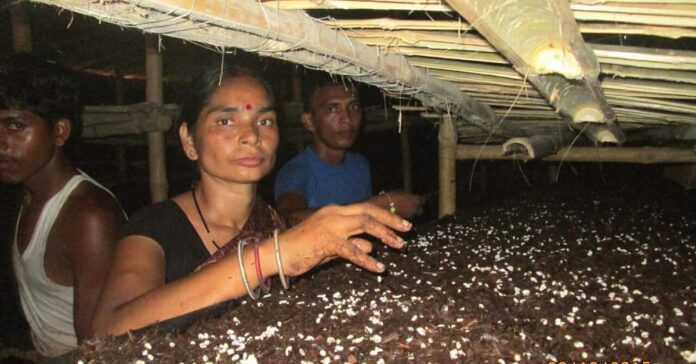
This Woman Started a Mushroom Farming Revolution and Groomed 20000 Entrepreneurs
Date:

Share post:
Mushroom farming was less well-known in Darbhanga, Bihar, a decade ago. According to national statistics, the state production of mushroom farming was nil until 2015, when the trend began to change.
PushpaJha, on the other hand, was way ahead of her time, having learned to grow them in 2010.
Because she was ahead of the curve, mushrooms were not in high demand, so she had to develop a market and compete for consumers. Her efforts, however, have opened the way for her and many others’ prosperity today.

It all started when her spouse Ramesh, a convent teacher, discovered a government agriculture department mushroom farming scheme in Pusa, Samastipur. “My husband didn’t want me to be bored at home, so he urged me to do something productive,” she says.
As a result, he was accompanied by Pushpa, a high school dropout. However, when they arrived at the training center the next day, administrators notified them that the training session’s seats were all taken. Ramesh pleaded with them to allow Pushpa to attend the six-day training course. That instruction was crucial in her becoming a successful businesswoman and in empowering hundreds of other women.
The Beginning Of A Mushroom Revolution
Pushpa began cultivating mushrooms after completing the program with a small cost of Rs 500 and open space in their 600-square-foot home. “I grew mushrooms underneath the bed or in a moist corner of the room.” “I grew the fungi in wheat husks and decaying hay balls,” the 43-year-old explains.
She placed the balls in a row and placed the stuff in a polythene bag. “It generated ideal humid conditions, and I was able to grow them.” I used to grow them and cook them as a veggie dish. “I chose to develop them for commercial reasons after gaining confidence,” Pushpa explains.

Pushpa chose a piece of land in Balbhadrapur village and built a bamboo room out of locally sourced materials to create a humid climate. She started producing button mushrooms in 1,000-bag batches and selling them at the local market. However, no one was interested in purchasing them. Because mushrooms are perishable, she suffered significant losses.
“There were very few individuals who knew what mushrooms were and how to eat them.” I began cultivating mushrooms and giving away 200-gram packets for free in my neighbourhood and at the market. “I taught them how to cook with them and eat them as veggies, pakodas, and other foods,” she recalls.
She goes on to say that the delightful food specialties were well appreciated and encouraged people to eat mushrooms. She gradually began to receive orders, earning her Rs 500 each day. She began cultivating oyster and milky types in addition to button mushrooms. Her popularity skyrocketed, and so did her earnings. She eventually began making vermicompost and producing spawns in order to cut manufacturing costs. Women in the neighbourhood began approaching her for mushroom cultivation lessons after seeing her accomplishment.
“I admired their inquisitiveness and pushed them to try growing mushrooms at home.” Women are preoccupied with household chores, which they complete by 11 a.m. or noon. They are usually free in the middle of the day before returning to work around 5 p.m. to make meals or look after the kids. As a result, I advised them to spend two hours of their spare time producing mushrooms,” she explains.
Pushpa was soon able to persuade more ladies to join the project. “Many women engage in low-wage activities such as sewing, quilting, and other low-wage activities. “I suggested they grow mushrooms because it took less time and yielded more,” she explains.

Pushpa began teaching women on a large basis and assisting them in becoming financially independent in 2015. She has now trained almost 20,000 people. “At first, I gave ladies free training and even supplied them with spawns. I lent them money on occasion to help the women put up a mushroom-growing room. It gave them confidence and allowed them to avoid incurring investment fees,” she adds.
Empowering the Women, Prisoners & Kids
People from other areas are now approaching Pushpa to learn how to grow mushrooms. “Men are now coming to study mushroom growing as well.” “I’ve had city residents come to me for a 10-day training class,” she says.
She earns Rs 2 lakh a year through mushroom training and sales. “My son and spouse assist me with the work. In addition, my son is pursuing horticulture in Allahabad and wants to explore farming as a way to develop our business,” she explains.
Pushpa has begun to process mushrooms for pickles, powders, cookies, and samosa appetisers. “The mushrooms frequently expire due to their short shelf-life. So, rather than letting the mushrooms go to waste, a group of ladies and I dried them and ground them into powder. “The powder can then be utilised in a variety of foods,” she explains.
Pushpa wishes to reach out to more women in order to expand the movement she began years ago. “Women in our region do not pursue employment and are frequently confined to their houses.” “However, mushroom farming builds their personalities by giving them dignity, respect, and confidence,” she continues.
